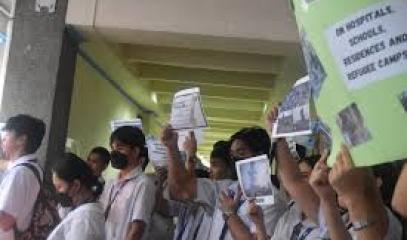Nun travells across Philippines to teach ‘honest and transparent’ voting
Since December, Sister Liza Ruedas, a nun of the Daughters of Charity, has launched an awareness campaign ahead of the midterm elections scheduled for May 12. The goal is to increase “awareness and participation in political change.” The Catholic Church of the Philippines has consecrated itself to Divine Mercy in the face of the "serious challenges" facing both the country and the world.
Manila (AsiaNews) – Educating citizens on how to vote, helping them identify “honest, clean, and transparent” candidates and representatives, and encouraging them to cast informed votes in the upcoming midterm elections on May 12: this is the mission of Sister Liza Ruedas, a nun of the Daughters of Charity (Company of the Daughters of Charity of Saint Vincent de Paul). Since last December, she has been spearheading this campaign with the help of fellow sisters, schools, lay missionaries, and the use of technology during her travels.
The nun uses materials provided by the Conference of Major Superiors of the Philippines (CMSP), ecumenical groups, the Simbayanihan movement, and other partner organizations. “We began the voter education program in December,” she explained to AsiaNews, aiming to conclude during the first week of May, just before election day. According to the Commission on Elections, there are 68,431,965 registered voters for the midterm elections, not including 1.3 million Filipinos abroad. Up for grabs are 18,320 local and national positions.
The goal, Sister Liza continues, is to “increase awareness and participation in political change, empowering the Filipino people and especially the youth. Most voters are finding democratic ways and spaces to participate in electoral reform.” The discussions range from how to choose good candidates to tackling possible electoral fraud, especially concerning vote-buying and identifying questionable or suspicious candidates.
“It’s very challenging and at the same time rewarding,” she emphasizes, “especially when working in the field. The poor and those in marginalized areas are always victims of political schemes and exploitation by traditional politicians.” There are also concerns about the automated voting system, which could be prone to fraud or at least raise doubts, not to mention the weight of political families and dynasties and clientelist systems. “I believe this issue,” the nun adds, “must be taken seriously not only during elections but also in other areas. Good governance and leadership must be taken seriously in schools, curricula, and communities.”
The aspiration behind the initiative is to provide every Filipino voter with greater awareness of their “rights, duties, and privileges.” Sister Liza stresses that “voting is a sacred act” and that political engagement is a contribution to change from a perspective of “charity.” The effort to make informed voting decisions, she warns, must “make a difference in people’s lives and in society. However, behaviors and attitudes are hard to change. It takes awareness, active participation, and commitment to the Philippine electoral system.”
The response from citizens to the educational program proposal is “mixed: some are enthusiastic, others not very interested,” the nun explains, adding that “younger students, in particular, show a willingness to learn and a high level of receptiveness,” and to support the awareness campaign, they can also use social media. Ahead of the elections, just yesterday, President Ferdinand Marcos Jr. issued Proclamation 878 to allow Filipinos to “properly exercise their right to vote” by declaring May 12 a non-working holiday.
Finally, with the goal of strengthening national unity, on April 27, Divine Mercy Sunday, the Catholic Church of the Philippines consecrated itself to Divine Mercy. The president of the Bishops' Conference (CBCP), Cardinal Pablo Virgilio David, invited all dioceses to a solemn act of consecration on this day, which was celebrated during Masses across the archipelago. According to the cardinal, the consecration is “a collective response of faith and hope” to the “serious challenges” facing the country and the world.
Some of these challenges include corruption, the erosion of truth, the increasing rejection of Church teachings on life and family, and the threat of internal divisions and armed conflicts both locally and globally. “The national consecration will be a profound expression of our trust in Divine Mercy, which remains our final refuge in these times of uncertainty and trial.” Cardinal David concluded by entrusting “ourselves, our Church, and our nation to the infinite mercy of God, confident that in it we will find the healing, renewal, and hope we so deeply need.”
07/02/2019 17:28
24/10/2019 17:56








.png)










